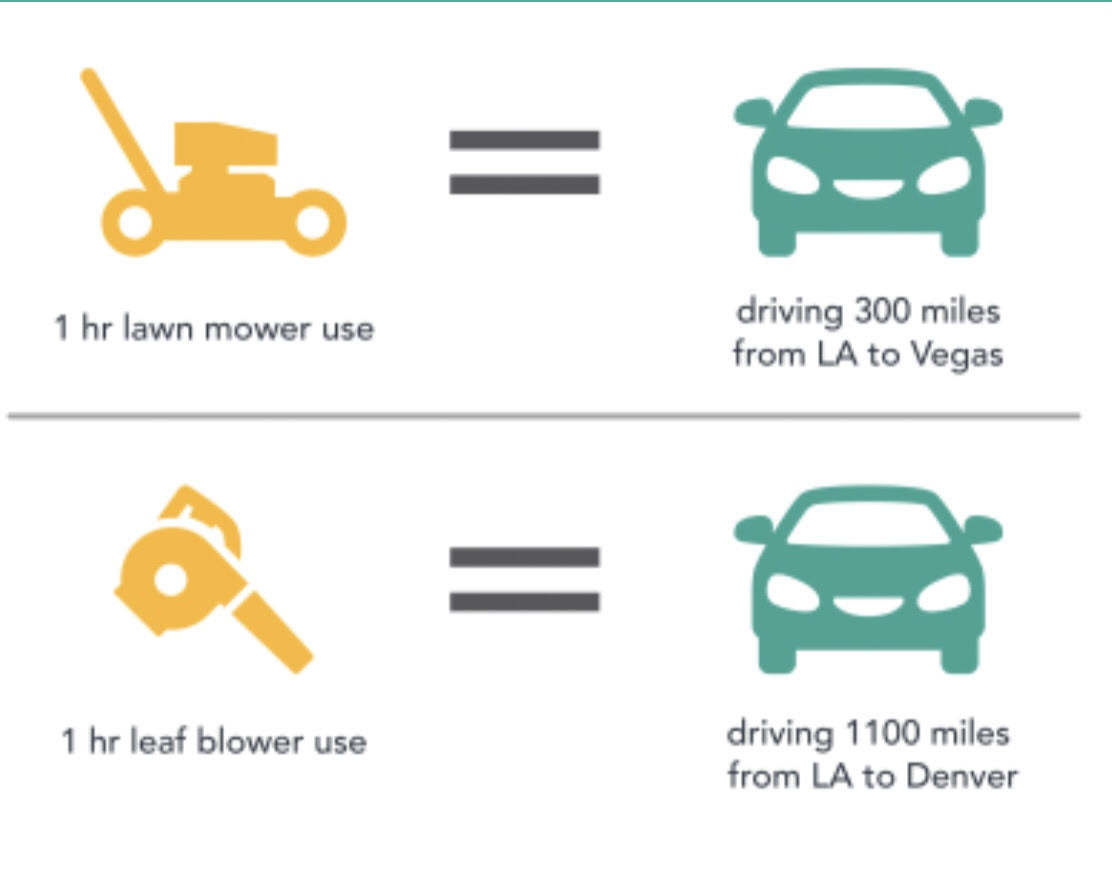What’s The Problem With Gas-Powered Landscape Equipment?
|
The use of gas-powered landscape equipment (GPLE), especially those with two-stroke engines, causes significant air and noise pollution that negatively impacts workers, children, pets, wildlife, neighborhoods, habitats, and soil health.
Two-stroke engines – commonly found in leaf blowers, string trimmers, hedge trimmers, and chainsaws – burn a mixture of gasoline and oil. They produce exhaust fumes laden with high levels of benzene, butadiene, formaldehyde, and other particulates which are known carcinogens and are associated with respiratory, cardiovascular, neurological, and reproductive harm. Toxic smog-forming emissions and noise pollution from these engines harm ecosystems and contribute to the climate crisis.
Gas-powered leaf blowers are universally considered to be the worst offenders. Low-frequency and high decibel, the noise of a gas leaf blower is significantly louder and travels much farther than its electric counterpart. The low frequency noise permeates walls and can negatively impact up to 90 surrounding homes. The noise contributes to hearing loss, high blood pressure, stress, impaired cognitive function, reduced productivity, and sleep disruption.
Additionally, gas leaf blowers create hurricane-force winds, sending dust that can contain pollen, mold, animal feces, heavy metals and chemicals from herbicides and pesticides into the air. Smoke and dust particles created when using leaf blowers are not simply a nuisance; they are harmful to our health. Fine particles are suspended in the air, then inhaled and deposited in the airways. There they can reach deep into the lungs, entering surrounding tissue and the bloodstream. People with respiratory or heart disease, diabetics, older adults, children, and pregnant women are at a greater risk when breathing polluted air.
|
Smog-forming emissions using gas-powered equipment
|

In response to growing public concern, local governments, states, utility companies and other entities across the country have adopted policies and programs to address the harmful pollution and noise generated by GPLE.
In March of this year, the City of Lake Oswego adopted a goal to phase out the use of GPLE in Lake Oswego. However, the timing of the phase-out is uncertain and it could be upwards of two years before implementation begins.
Here is the City of Lake Oswego’s goal:
Develop an operational plan, potential code options and communications strategy to phase out use of gas-powered yard and lawn care equipment in Lake Oswego after the City of Portland’s ban goes into effect. This project should have a two-year time frame.
In light of this, it remains critical that we take action as individuals to eliminate the use of GPLE at our homes, schools, and businesses; especially the use of gas leaf blowers. The faster we transition to more sustainable landscaping practices, the sooner we will all experience the multitude of benefits.
|

Here are some simple but powerful steps we can take personally that will directly and dramatically impact the collective health and overall quality of life in our neighborhood. If you use a landscaper, please ask them to adopt these practices!
|
- Leave the leaves – they provide habitat for beneficial insects, important nutrients to the soil, absorb carbon, and help to retain moisture.
- Avoid the use of all leaf blowers around plantings. Leaf blowers erode and compact the soil and destroy habitat for insects and pollinators.
- Use rakes and brooms instead of blowers on hardscapes. Using a blower sends pollution, dust, pollen, mold and fine particulates into the air.
- If you or your landscaper still need a power assist, use electric tools instead of gas-powered; they’re affordable and effective, and they’re cleaner and quieter than their gas counterparts. Be mindful of people and animals nearby, and avoid blowing onto the property of others or into storm drains.
- Share your electric tools with your landscaper and neighbors. Plan to provide your landscaper with a fresh battery or extension cord on your day of service.
- Adopt the practices of regenerative landscaping, whether it’s you or someone you hire that is caring for your garden.
|
|
|